Leaders Influencing Unethical Behavior Case Study: WorldCom Example
VerifiedAdded on 2023/05/30
|5
|902
|67
Case Study
AI Summary
This case study examines the influence of leaders on unethical behavior within the workplace, using Bernard Ebbers and the WorldCom scandal as a focal point. The assignment delves into Ebbers' leadership style, exploring how his actions and decisions, such as cost-cutting measures, autocratic tendencies, and disregard for employee input, contributed to a culture of unethical practices. The analysis covers various aspects of leadership, including transactional and autocratic styles, and their impact on employee behavior and organizational performance. It also discusses the importance of ethical leadership and the consequences of failing to establish a culture of integrity and transparency. The document references several academic sources to support its arguments and provides a comprehensive overview of the case, emphasizing the importance of ethical leadership in preventing organizational deviance.
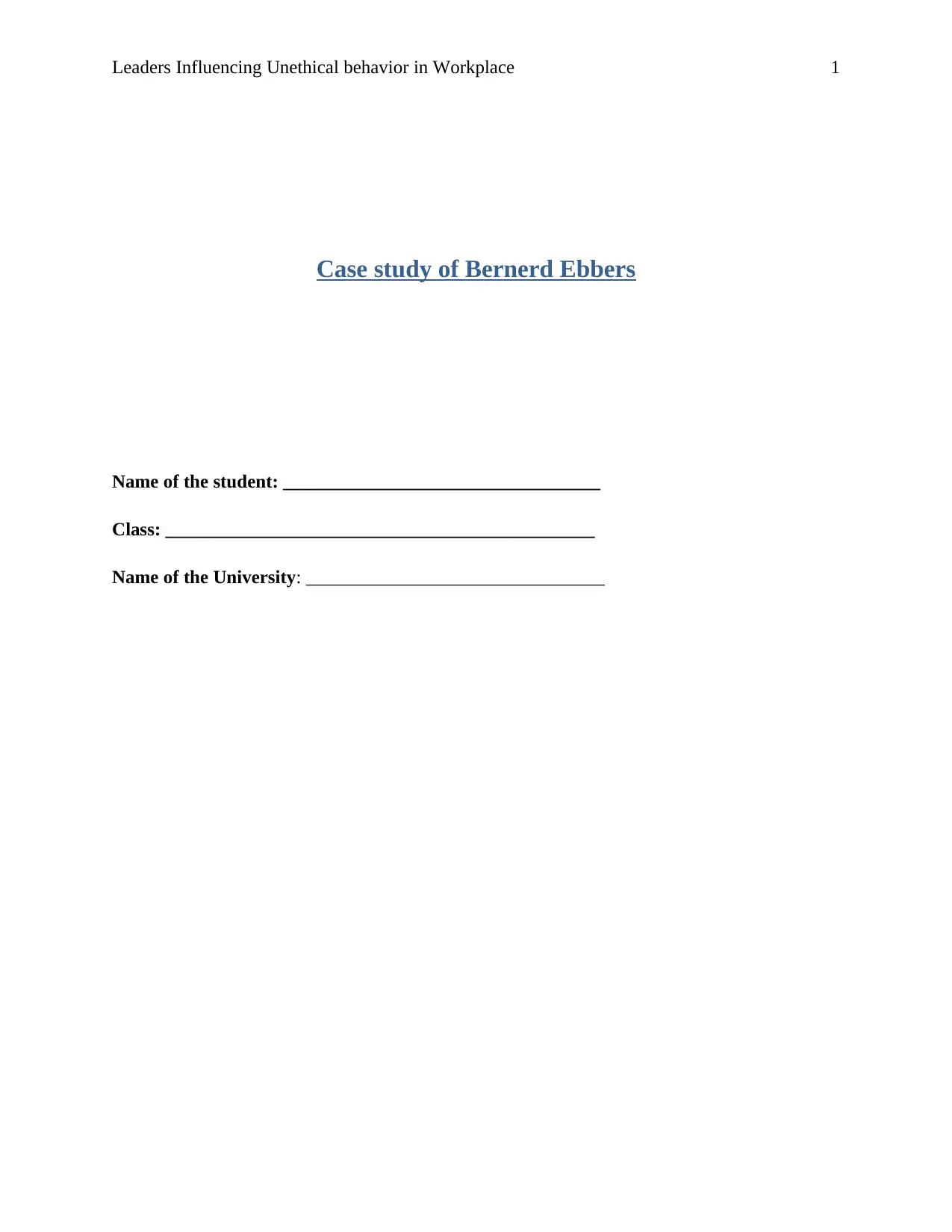
Leaders Influencing Unethical behavior in Workplace 1
Case study of Bernerd Ebbers
Name of the student: __________________________________
Class: ______________________________________________
Name of the University: ________________________________
Case study of Bernerd Ebbers
Name of the student: __________________________________
Class: ______________________________________________
Name of the University: ________________________________
Paraphrase This Document
Need a fresh take? Get an instant paraphrase of this document with our AI Paraphraser
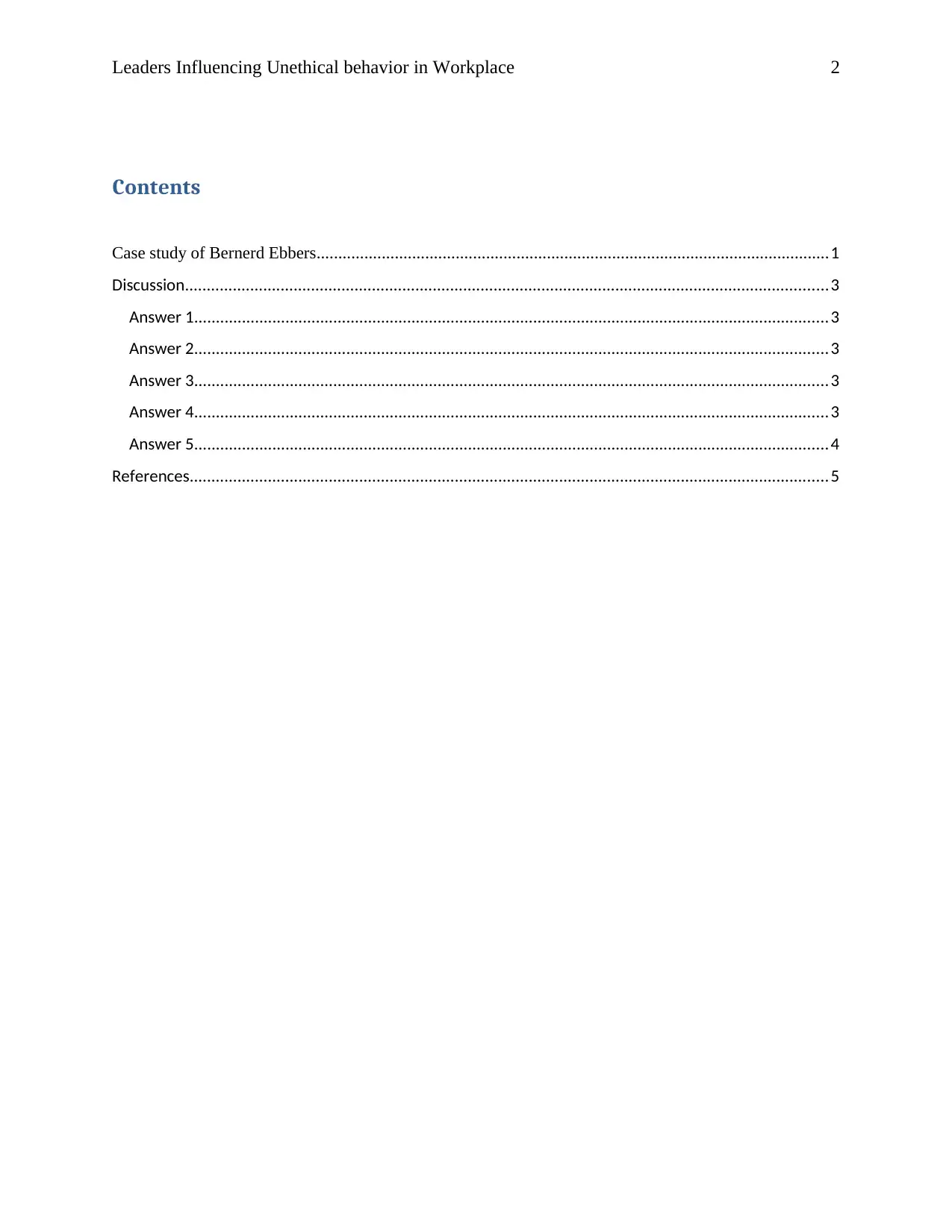
Leaders Influencing Unethical behavior in Workplace 2
Contents
Case study of Bernerd Ebbers......................................................................................................................1
Discussion....................................................................................................................................................3
Answer 1..................................................................................................................................................3
Answer 2..................................................................................................................................................3
Answer 3..................................................................................................................................................3
Answer 4..................................................................................................................................................3
Answer 5..................................................................................................................................................4
References...................................................................................................................................................5
Contents
Case study of Bernerd Ebbers......................................................................................................................1
Discussion....................................................................................................................................................3
Answer 1..................................................................................................................................................3
Answer 2..................................................................................................................................................3
Answer 3..................................................................................................................................................3
Answer 4..................................................................................................................................................3
Answer 5..................................................................................................................................................4
References...................................................................................................................................................5
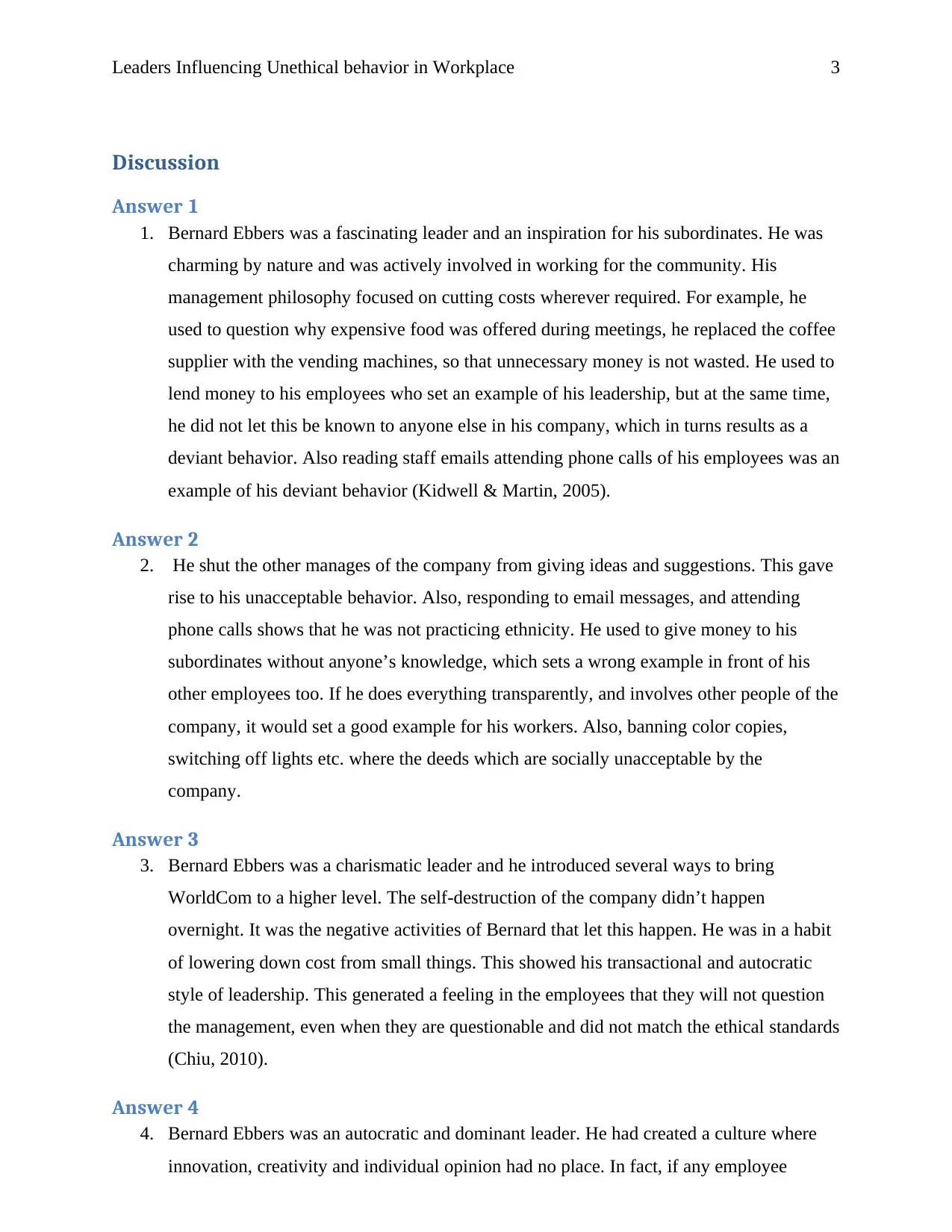
Leaders Influencing Unethical behavior in Workplace 3
Discussion
Answer 1
1. Bernard Ebbers was a fascinating leader and an inspiration for his subordinates. He was
charming by nature and was actively involved in working for the community. His
management philosophy focused on cutting costs wherever required. For example, he
used to question why expensive food was offered during meetings, he replaced the coffee
supplier with the vending machines, so that unnecessary money is not wasted. He used to
lend money to his employees who set an example of his leadership, but at the same time,
he did not let this be known to anyone else in his company, which in turns results as a
deviant behavior. Also reading staff emails attending phone calls of his employees was an
example of his deviant behavior (Kidwell & Martin, 2005).
Answer 2
2. He shut the other manages of the company from giving ideas and suggestions. This gave
rise to his unacceptable behavior. Also, responding to email messages, and attending
phone calls shows that he was not practicing ethnicity. He used to give money to his
subordinates without anyone’s knowledge, which sets a wrong example in front of his
other employees too. If he does everything transparently, and involves other people of the
company, it would set a good example for his workers. Also, banning color copies,
switching off lights etc. where the deeds which are socially unacceptable by the
company.
Answer 3
3. Bernard Ebbers was a charismatic leader and he introduced several ways to bring
WorldCom to a higher level. The self-destruction of the company didn’t happen
overnight. It was the negative activities of Bernard that let this happen. He was in a habit
of lowering down cost from small things. This showed his transactional and autocratic
style of leadership. This generated a feeling in the employees that they will not question
the management, even when they are questionable and did not match the ethical standards
(Chiu, 2010).
Answer 4
4. Bernard Ebbers was an autocratic and dominant leader. He had created a culture where
innovation, creativity and individual opinion had no place. In fact, if any employee
Discussion
Answer 1
1. Bernard Ebbers was a fascinating leader and an inspiration for his subordinates. He was
charming by nature and was actively involved in working for the community. His
management philosophy focused on cutting costs wherever required. For example, he
used to question why expensive food was offered during meetings, he replaced the coffee
supplier with the vending machines, so that unnecessary money is not wasted. He used to
lend money to his employees who set an example of his leadership, but at the same time,
he did not let this be known to anyone else in his company, which in turns results as a
deviant behavior. Also reading staff emails attending phone calls of his employees was an
example of his deviant behavior (Kidwell & Martin, 2005).
Answer 2
2. He shut the other manages of the company from giving ideas and suggestions. This gave
rise to his unacceptable behavior. Also, responding to email messages, and attending
phone calls shows that he was not practicing ethnicity. He used to give money to his
subordinates without anyone’s knowledge, which sets a wrong example in front of his
other employees too. If he does everything transparently, and involves other people of the
company, it would set a good example for his workers. Also, banning color copies,
switching off lights etc. where the deeds which are socially unacceptable by the
company.
Answer 3
3. Bernard Ebbers was a charismatic leader and he introduced several ways to bring
WorldCom to a higher level. The self-destruction of the company didn’t happen
overnight. It was the negative activities of Bernard that let this happen. He was in a habit
of lowering down cost from small things. This showed his transactional and autocratic
style of leadership. This generated a feeling in the employees that they will not question
the management, even when they are questionable and did not match the ethical standards
(Chiu, 2010).
Answer 4
4. Bernard Ebbers was an autocratic and dominant leader. He had created a culture where
innovation, creativity and individual opinion had no place. In fact, if any employee
⊘ This is a preview!⊘
Do you want full access?
Subscribe today to unlock all pages.

Trusted by 1+ million students worldwide
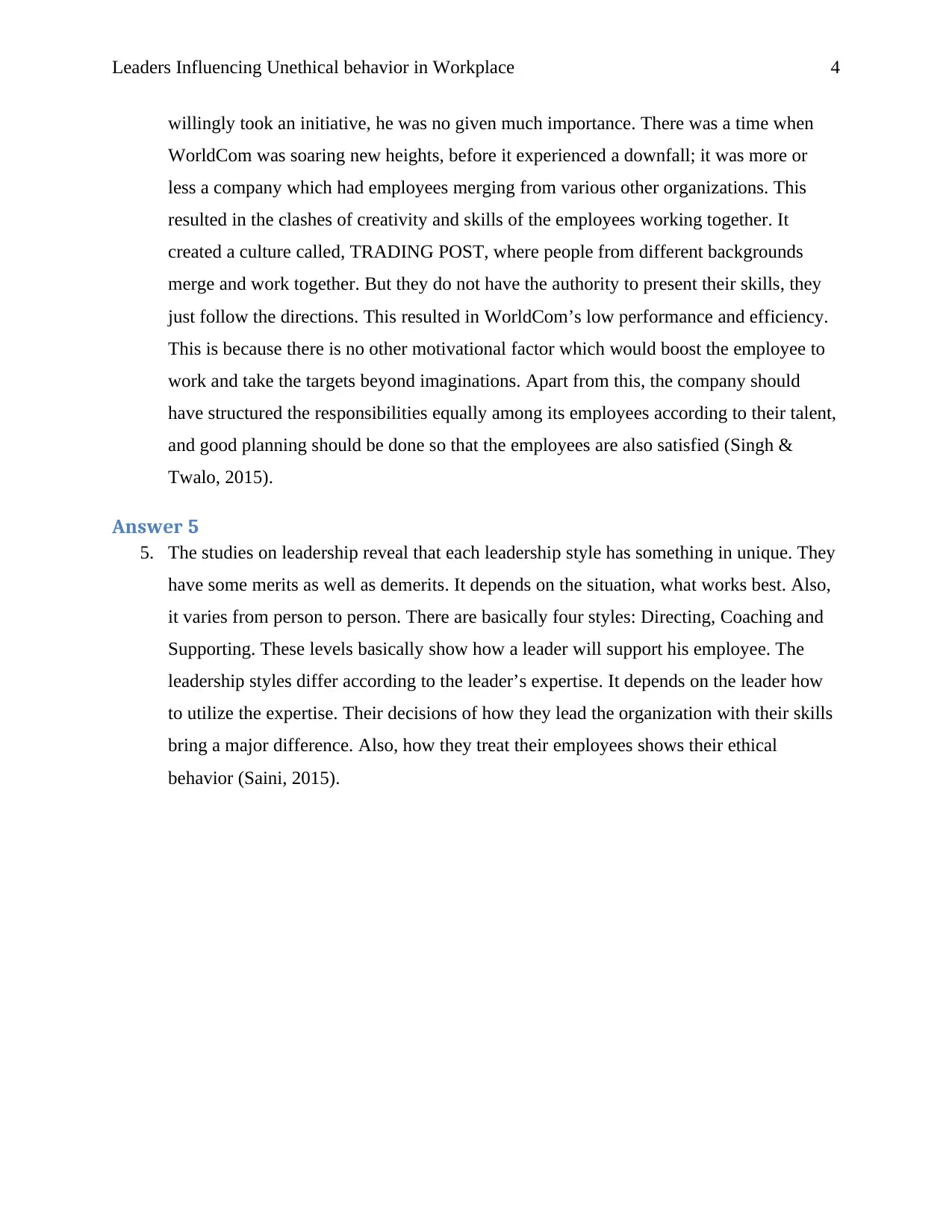
Leaders Influencing Unethical behavior in Workplace 4
willingly took an initiative, he was no given much importance. There was a time when
WorldCom was soaring new heights, before it experienced a downfall; it was more or
less a company which had employees merging from various other organizations. This
resulted in the clashes of creativity and skills of the employees working together. It
created a culture called, TRADING POST, where people from different backgrounds
merge and work together. But they do not have the authority to present their skills, they
just follow the directions. This resulted in WorldCom’s low performance and efficiency.
This is because there is no other motivational factor which would boost the employee to
work and take the targets beyond imaginations. Apart from this, the company should
have structured the responsibilities equally among its employees according to their talent,
and good planning should be done so that the employees are also satisfied (Singh &
Twalo, 2015).
Answer 5
5. The studies on leadership reveal that each leadership style has something in unique. They
have some merits as well as demerits. It depends on the situation, what works best. Also,
it varies from person to person. There are basically four styles: Directing, Coaching and
Supporting. These levels basically show how a leader will support his employee. The
leadership styles differ according to the leader’s expertise. It depends on the leader how
to utilize the expertise. Their decisions of how they lead the organization with their skills
bring a major difference. Also, how they treat their employees shows their ethical
behavior (Saini, 2015).
willingly took an initiative, he was no given much importance. There was a time when
WorldCom was soaring new heights, before it experienced a downfall; it was more or
less a company which had employees merging from various other organizations. This
resulted in the clashes of creativity and skills of the employees working together. It
created a culture called, TRADING POST, where people from different backgrounds
merge and work together. But they do not have the authority to present their skills, they
just follow the directions. This resulted in WorldCom’s low performance and efficiency.
This is because there is no other motivational factor which would boost the employee to
work and take the targets beyond imaginations. Apart from this, the company should
have structured the responsibilities equally among its employees according to their talent,
and good planning should be done so that the employees are also satisfied (Singh &
Twalo, 2015).
Answer 5
5. The studies on leadership reveal that each leadership style has something in unique. They
have some merits as well as demerits. It depends on the situation, what works best. Also,
it varies from person to person. There are basically four styles: Directing, Coaching and
Supporting. These levels basically show how a leader will support his employee. The
leadership styles differ according to the leader’s expertise. It depends on the leader how
to utilize the expertise. Their decisions of how they lead the organization with their skills
bring a major difference. Also, how they treat their employees shows their ethical
behavior (Saini, 2015).
Paraphrase This Document
Need a fresh take? Get an instant paraphrase of this document with our AI Paraphraser
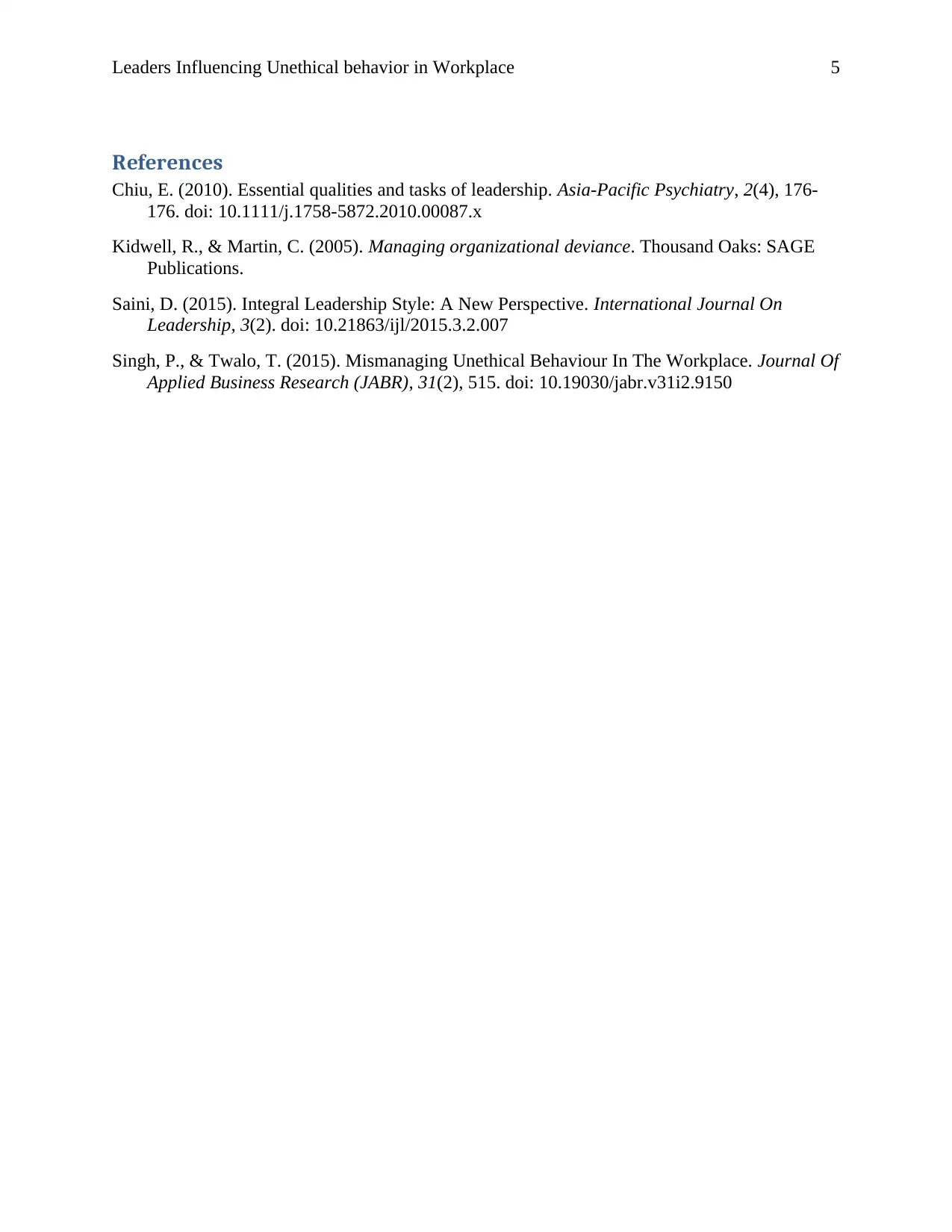
Leaders Influencing Unethical behavior in Workplace 5
References
Chiu, E. (2010). Essential qualities and tasks of leadership. Asia-Pacific Psychiatry, 2(4), 176-
176. doi: 10.1111/j.1758-5872.2010.00087.x
Kidwell, R., & Martin, C. (2005). Managing organizational deviance. Thousand Oaks: SAGE
Publications.
Saini, D. (2015). Integral Leadership Style: A New Perspective. International Journal On
Leadership, 3(2). doi: 10.21863/ijl/2015.3.2.007
Singh, P., & Twalo, T. (2015). Mismanaging Unethical Behaviour In The Workplace. Journal Of
Applied Business Research (JABR), 31(2), 515. doi: 10.19030/jabr.v31i2.9150
References
Chiu, E. (2010). Essential qualities and tasks of leadership. Asia-Pacific Psychiatry, 2(4), 176-
176. doi: 10.1111/j.1758-5872.2010.00087.x
Kidwell, R., & Martin, C. (2005). Managing organizational deviance. Thousand Oaks: SAGE
Publications.
Saini, D. (2015). Integral Leadership Style: A New Perspective. International Journal On
Leadership, 3(2). doi: 10.21863/ijl/2015.3.2.007
Singh, P., & Twalo, T. (2015). Mismanaging Unethical Behaviour In The Workplace. Journal Of
Applied Business Research (JABR), 31(2), 515. doi: 10.19030/jabr.v31i2.9150
1 out of 5
Your All-in-One AI-Powered Toolkit for Academic Success.
+13062052269
info@desklib.com
Available 24*7 on WhatsApp / Email
![[object Object]](/_next/static/media/star-bottom.7253800d.svg)
Unlock your academic potential
Copyright © 2020–2025 A2Z Services. All Rights Reserved. Developed and managed by ZUCOL.


